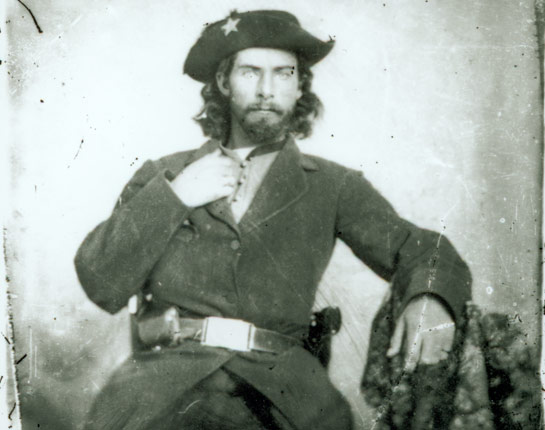Jesse James as an Adult
Guerrilla warfare was common during the American Civil War, consisting mainly of fights between local militia of the Union and the Confederates. At the start of the war, Jesse James’ family chose to be on the Confederate side. Jesse’s brother, Frank James, was an active member in a Confederate guerrilla squad, and committed enough against the Union to cause them to actively hunt him down.
When James was sixteen, he joined the squad that Frank was in, led by a man named Fletch Taylor. In 1864, after Taylor was shot and wounded, the two James brothers left his group and joined another one led by Bloody Bill Anderson. It is said that, at that time, the James brothers had participated in the Centralia Massacre.
The constant guerrilla actions of the two brothers led to their family being driven out of Clay County by the Union authorities. They moved to Nebraska, and soon after James went his own way and joined the group of Archie Clement in Texas.
He met Zerelda Mimms, his first cousin, who tended to a gun wound he had received at eighteen years old. They courted for nine years and were eventually married. They had four children, two of them twins that didn’t make it past infancy.
Even after the war, there was a disturbing increase in the violence in local areas. Guerrillas ran amok, including the gang that James was part of. Although Clement was eventually killed in 1866, James and the rest of the gang continued to rob banks, already creating their own legend.
It is said that the real legend of James’ rise to fame started when he and his brother robbed the Daviess County Savings Association on December 7, 1869. James killed one of the cashiers who, he later claimed, had looked like the man responsible for Bloody Bill Anderson’s death. The act of revenge, though wrongfully done, made papers. James found himself named as an outlaw for the first time.
He and his brother Frank eventually joined up with the Younger brothers, and together they formed the James-Younger Gang. Throughout their active career, they robbed everything from stagecoaches, to fairs and banks. In due course, train robbing became a part of their style, starting on July 21, 1873.
The James-Younger Gang ended on September 7, 1876 when an attempt to raid a bank left only the James brothers both free and alive. Three years later, James formed another group. By then, Jesse had grown restless and paranoid, worrying about his family and gang members.
